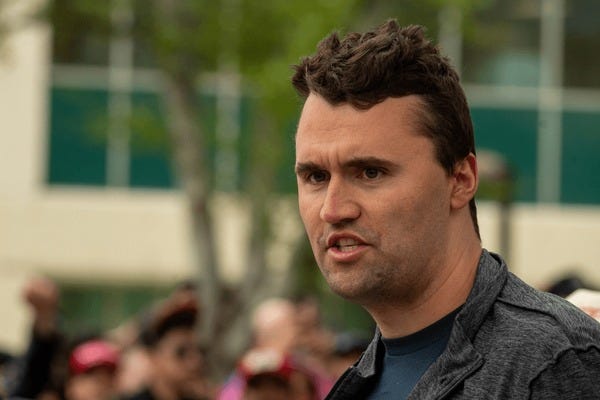Many of us are conditioned in a certain kind of moral culture (liberal, socially conscious, media-saturated) to treat any tragic death as sacred. To offer condolences, to imagine ourselves in the place of the bereaved, to assume that, no matter how reprehensible the person, something in them was human, something in their death demands our remorse, our public mourning.
That impulse is almost automatic, reinforced by news cycles, by politicians of both sides (when the victim is right wing) and by social media. Someone dies violently, and the chorus begins. Hearts, prayers, the language of loss. It is as perfunctory as it is performative, but we’ve come to see it as required to say something, to feel something, to display our own compassion.
But what if we refuse that performance? What if we legitimately believe someone (who has now been murdered) was not merely mistaken or someone we disagreed with, but was an unapologetic advocate for white supremacy? What if their public life was suffused with ideas - replacement theory, demonization of people of color and immigrants, Islamophobia, attacks on transgender people, anti-LGBTQ policies, exclusionary visions of “America” - that have real harms, not merely “controversial,” but fuel for oppression and violence? Is there space, in our moral logic, for refusing to treat a white supremacist as someone who merits our empathetic responses? Is that refusal a betrayal of our decency, or is it a different kind of integrity?
The murder of Charlie Kirk (a prominent far-right conservative activist, founder of Turning Point USA, a lightning rod for white supremacy over many years) has now opened up public discussion not only of the political implications of his death - of violence, of threats, of rhetorical escalation - but also of what we owe the dead, especially those who propagated divisive ideologies.
There is a heavy cultural expectation for a mixture of sorrow, moral clarity, condemnation of the violence, but also remembrance of “good qualities,” “doing politics the right way,” "he had a young family" etc. But those “good qualities” and that young family often came precisely within or adjacent to the rhetoric of white identity politics and of framing non-white or non-Christian or non-straight people as threats.
So what, precisely, do we owe a dead white supremacist? My feeling is: absolutely nothing.
Empathy Has Cost
Empathy is not without cost. When you extend empathy to someone who has inflicted egregious harm you take on these risks:
Normalizing & Minimizing. The instant reflexive gush of “thoughts and prayers” has already functioned as a kind of industrial-strength Febreze for Kirk’s record, converting years of dog-whistled bile into “controversial remarks” (the journalistic euphemism equivalent of calling Chernobyl a “rough patch”). Suddenly his talk of prowling Black people and demographic invasions becomes downgraded to “spirited disagreement.”
Victim-Centering the Wrong Causes. Empathy likes to follow the cameras, which means it clusters around the single, suddenly-dead body rather than the thousands of still-living ones he spent years targeting: immigrants, Muslims, trans kids, Black communities. If you’re not careful, the ledger of harm flips upside-down, and Kirk becomes the sympathetic figure while the people he stigmatized get shunted to background noise, like extras in someone else’s tragedy.
False Equivalence on Steroids. Cue the anchor voice: “We should remember that Charlie Kirk was someone’s father, someone’s husband, and that his death is heartbreaking. At the same time, some of his remarks about immigrants and Black Americans were controversial.” That sounds responsibly even-handed until you realize it’s laundering hate into “just another opinion.” It’s like saying: “Yes, Ted Bundy was a serial killer, but he also really loved golden retrievers.” Balance achieved, moral clarity obliterated...
Dilution of Clarity. In a moment where political violence is escalating, we need bright, neon, Vegas-level signage about what is and isn’t acceptable. As things slip further into fascism we need to be relentless about this. Needless empathy for the architects of ideological violence is like a dimmer switch on those signs.
One of the reasons why I balk at calling this assassination "political violence" is that racism and white supremacy are not political ideologies, they are sheer wickedness. And, no, I'm not going to soften my discernment because he happened to be a father.
(Gustav Klimt)
For me to say “you don’t have to perform empathy” is not the same as saying “you’re allowed to be cruel” or “you should be gleeful.” And that distinction is not even subtle, it is obvious to anyone with sense and a functioning moral compass.
Refusing to perform empathy doesn’t equate to endorsing or celebrating the death, though I will not police the responses of those harmed by Kirk. Rather, it means one does not feel compelled to act as if every life lost is morally equivalent in terms of one’s sympathy or public mourning.
It can be a way of honoring those who suffered because of the person's ideology. Sometimes the refusal to perform empathy isn’t about the dead at all; it’s about those who are alive and have been harmed, whose pain is often ignored when collective mourning takes over social space.
It’s possible, even natural, to feel twinges of empathy for Charlie Kirk or for the grief his family is enduring. The suddenness of death, the brutal manner of murder, the human loss. But it’s worth pausing and asking: do I respond the same way to the people he spent years dehumanizing, those who I see dying every day? Does it extend to the people of Gaza, to immigrants ripped from families, to Black and Muslim communities he cast as threats? If you notice an imbalance in your emotional responses you need to pay attention. That asymmetry matters and is a sign of the pervasiveness of white supremacy in our culture.
Charlie Kirk Was Not Just A Racist Relative
Charlie Kirk was not just your cranky uncle at Thanksgiving or the cousin who shares MAGA memes on Facebook. The difference is scale and intentionality. An average Trump-voting relative is likely to repeat racist tropes or harbor prejudices, but usually within the confines of family conversations, or social media echo chambers. What separates Kirk from your relative isn’t just volume but infrastructure; the machinery of a whole organization designed to make fear and hatred go viral, and it’s that machinery we have to reckon with now.




